Inside Trump’s ‘fascist’ dreams for a second term
Donald Trump seeks revenge with a second-term agenda more extreme than his first, Alex Woodward reports

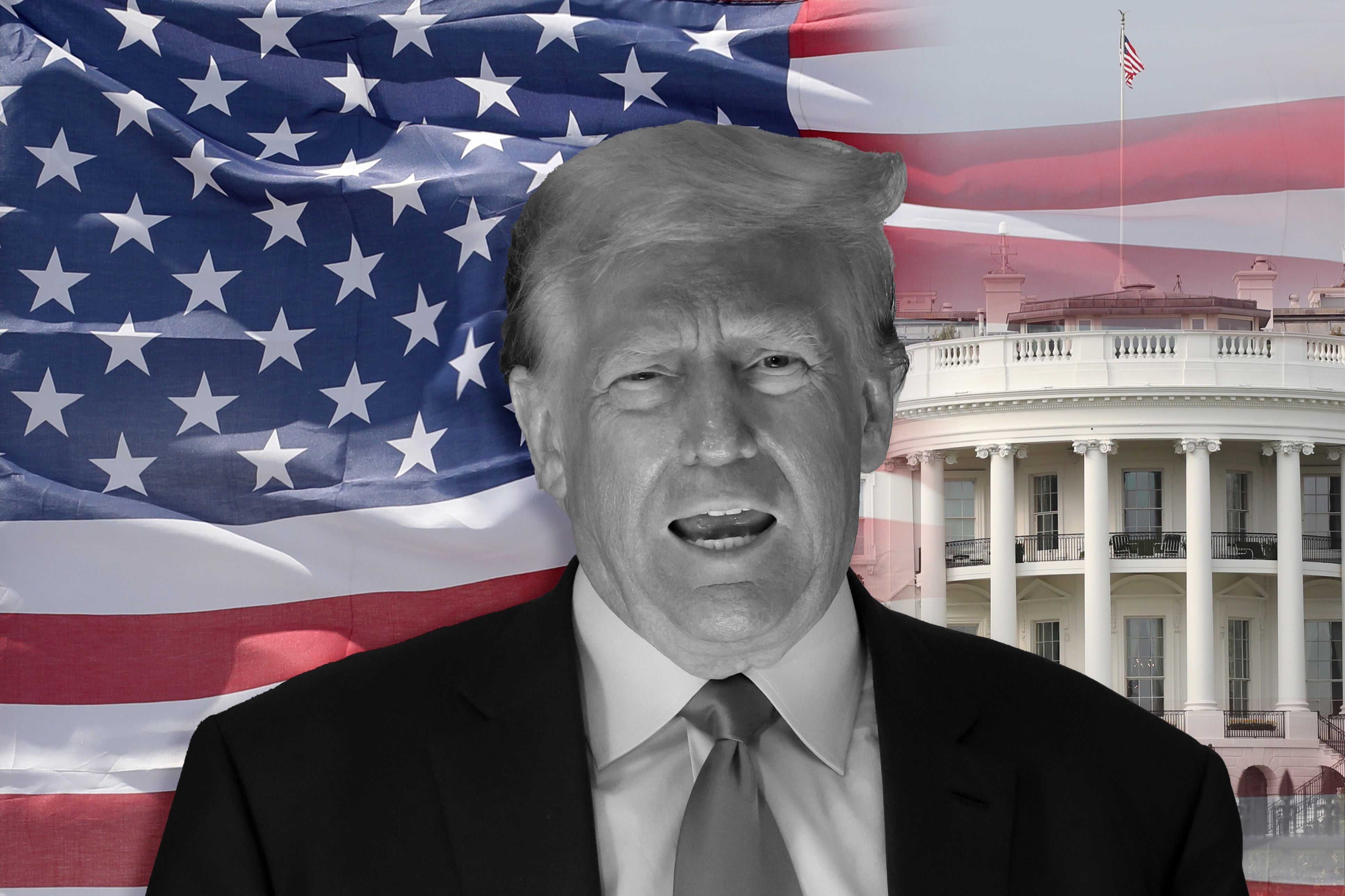
Your support helps us to tell the story
From reproductive rights to climate change to Big Tech, The Independent is on the ground when the story is developing. Whether it's investigating the financials of Elon Musk's pro-Trump PAC or producing our latest documentary, 'The A Word', which shines a light on the American women fighting for reproductive rights, we know how important it is to parse out the facts from the messaging.
At such a critical moment in US history, we need reporters on the ground. Your donation allows us to keep sending journalists to speak to both sides of the story.
The Independent is trusted by Americans across the entire political spectrum. And unlike many other quality news outlets, we choose not to lock Americans out of our reporting and analysis with paywalls. We believe quality journalism should be available to everyone, paid for by those who can afford it.
Your support makes all the difference.His plans for the White House aren’t a secret. He spends hours on the stages of his campaign rallies outlining a violent agenda for a second term. His supporters applaud. His allies are even more explicit.
Donald Trump’s volatile campaign – calling his adversaries “vermin” and echoing the pages of Mein Kampf and white supremacist manifestos – has flooded news outlets and social media with so many appeals to authoritarianism and violence that they barely register as news. Republicans shrug. His surrogates laugh off criticism. Americans are told not to take him seriously while he’s also the subject of countless warnings about the country’s dissolution into autocracy.
Still lying about his loss in the 2020 presidential election, he would see his return to the White House as retribution for what he falsely believes he was denied over the previous four years. He tells his supporters that “they” stole that from them, too. He would then destroy everything in his way.
A Donald Trump presidency in 2025 would employ an army of loyalists to weaponise the federal government to let him seek political revenge. He could use the US military as his domestic law enforcement. Immigrants would face ideological tests, mass police violence and incarceration. Transgender Americans would be stripped of their civil rights. Public school curriculums would be dismantled, in favour of right-wing propaganda. Drug offenders could be sentenced to death.
The prosecutors and judges overseeing criminal cases against him would be fired or jailed. Those charges could disappear, along with institutional guardrails and first amendment protections that hold power to account.
The people who run the nation’s elections, and the election administration itself, would become the targets instead, while members of a mob that stormed the US Capitol to overturn Mr Trump’s loss in the 2020 election would be pardoned.
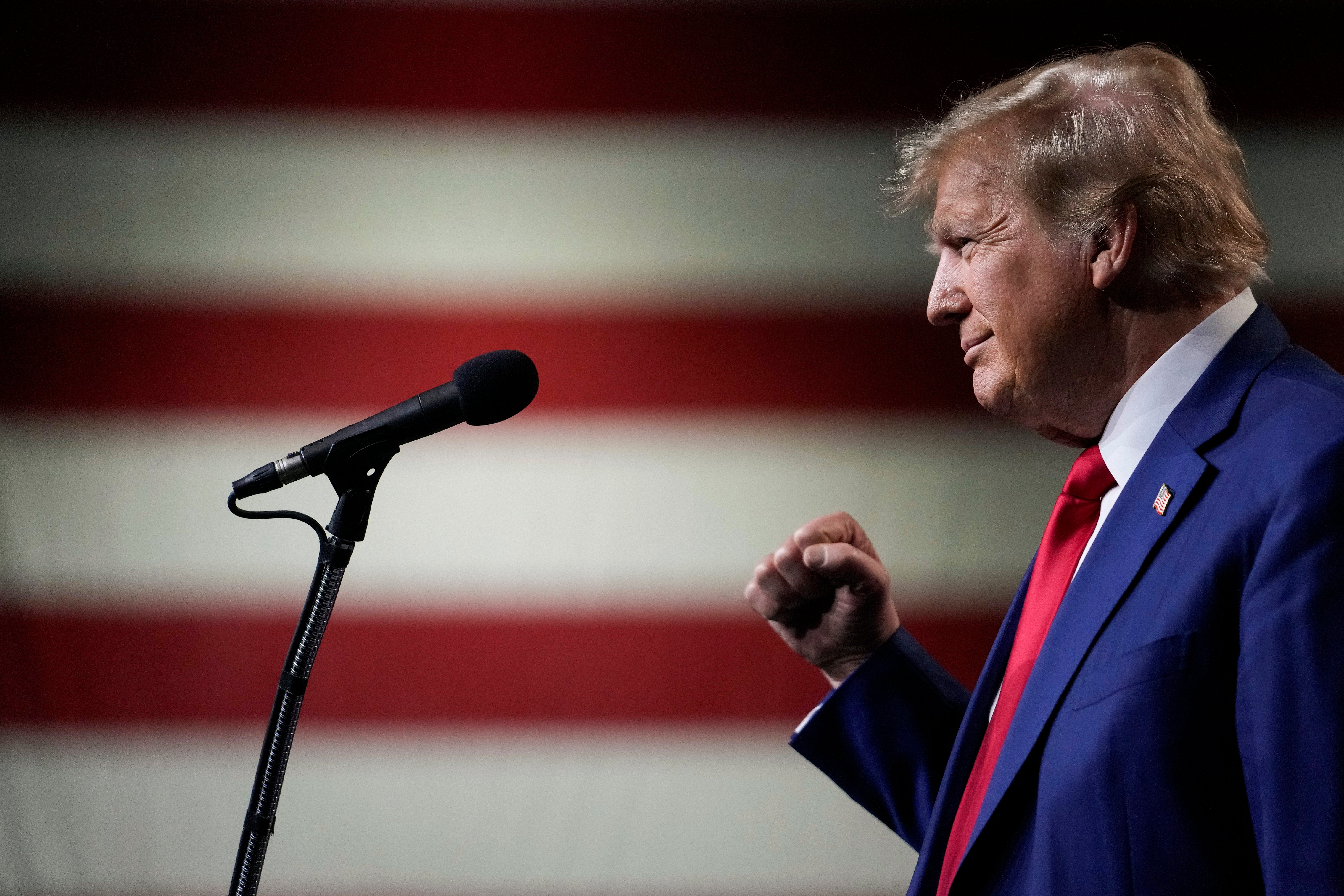
He repeats his campaign pledges at every rally, almost word for word.
Whether he can actually pull the trigger depends on the future of the criminal trials and the growing number of legal battles against him, threats to his eligibility for holding public office altogether, elections that will determine the balance of power in Congress, elections to determine which GOP nominee will face Joe Biden in November, and if Mr Trump wins at all.
Government chaos
At the core of Mr Trump’s agenda is a plan sanctioned by right-wing interest groups that would implement a first-day blitzkrieg of firings across the federal government.
Mr Trump’s first-term plan – all those promises to “drain the swamp” and eliminate the “deep state” in Washington DC – never materialised. He grew increasingly frustrated that his own government was investigating him or impeding his agenda.
In the final weeks of his presidency, Mr Trump unveiled an executive order to create a new class of federal employee, Schedule F, that would allow a president to turn any career official with a policy advisory role into a political appointee, opening the door for a dramatically politicised federal workforce and stripping away job protections that could affect thousands of workers who could be more easily fired if they did not conform to the president’s agenda.
The order could destabilise the federal government, replacing constitution-bound officials with Trump loyalists intent on avoiding obligations and oversight from Congress and the public. They could also insulate the former president against the wave of legal threats against him.
President Biden rescinded the order when he took office in 2021.
“The overt purpose of Schedule F is partisan politicisation, centred on political loyalty to the president. But the oath that public employees take is to serve the constitution, not the president,” according to Georgetown University public policy researcher Donald Moynihan. “Schedule F frustrates the institutional design of checks and balances, especially weakening legislative power.”
The Trump campaign’s first order of business in a “10-point plan to dismantle the deep state” would reinstate the order. The second would “overhaul federal departments and agencies, firing all of the corrupt actors in our National Security and Intelligence apparatus.”
A nearly 1,000-page “Project 2025” plan from the Heritage Foundation, with support from former Trump administration officials, has tapped thousands of ideologically aligned potential future appointees.
“Autocrats need a compliant civil service,” authoritarianism scholar Ruth Ben-Ghiat, author of Strongmen: Mussolini to the Present, told The Independent.
“The whole point is to create an executive, ie Donald Trump, who is unrestrained and also an executive who is safe from legal trouble,” she said. “Targeting the judiciary, the threatening of judges, prosecutors, Trump saying that [special counsel] Jack Smith should end up in a ‘mental institution’ – all of this is what autocrats do because if autocrats have legal problems, they want to get back into power and fix things so that all their legal troubles will go away permanently.”
‘Retribution’ and revenge
Mr Trump launched his 2024 campaign from Waco Regional Airport in Texas, 20 minutes from the lethal standoff between federal agents and Branch Davidian religious sect in nearby Elk, Texas.
He staged a rally on its 30th anniversary.
In the first official rally of his 2024 campaign, which opened with a song from a prison choir of men jailed in connection with the Capitol attacks, the former president framed the election as a “final battle”.
“I am your warrior. I am your justice,” he said. “And I took a lot of heat for this one, but I only meant it in the proper way – to those who have been wronged and betrayed, of which there are many people out there, I will be your retribution.”
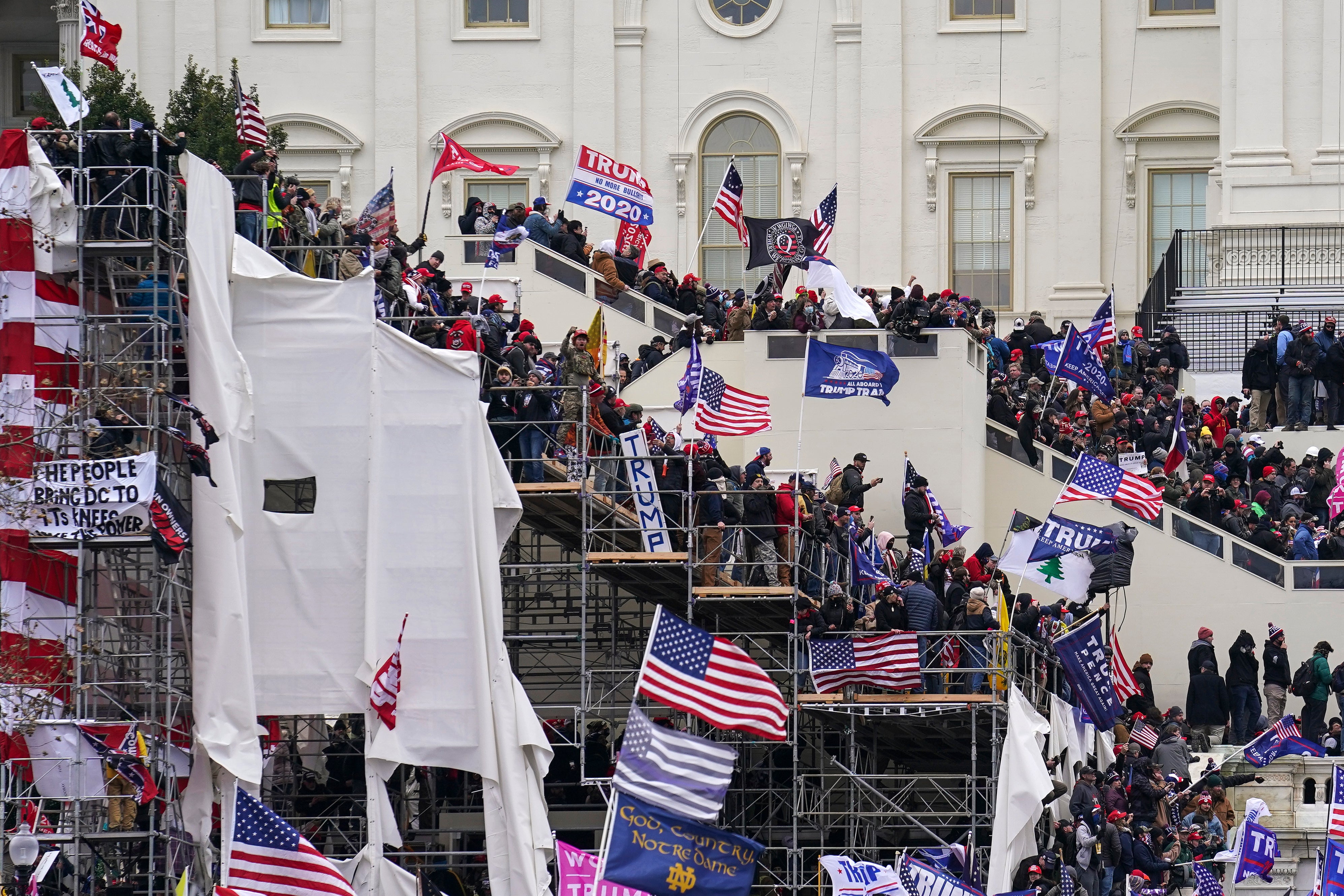
Mr Trump has promised mass pardons for the hundreds of people convicted on charges connected to 6 January. In New Hampshire last month, he called 6 January defendants “hostages” days after federal prosecutors warned that they intend to use his endorsement of their alleged actions in the election conspiracy case against him.
He has embraced the “J6 Prison Choir”, a group of defendants who remain in a Washington DC jail for crimes that, according to federal prosecutors, “were so violent that their pretrial release would pose a danger to the public”. He plays their songs at his rallies.
He has spent months attacking the judges overseeing the cases against him, the prosecutors and attorneys general pursuing them, and allowing his supporters to launch death threats and harassment that could not only compromise the proceedings but also terrorise court staff and potential jurors.
His campaign has raised millions of dollars from those cases and the outrage he feeds his supporters about them. A narrative of political persecution, which he tells his supporters is also coming for them, is central to his campaign, along with the persistent lie that the 2020 election was “stolen” from him and his supporters.
Mr Trump spread false claims about the electoral process and used conspiracy theories to cast doubt on the legitimacy of elections in the months before the 2016 and 2020 elections. Those claims have since animated Republican attempts to challenge results and craft legislation to do what Mr Trump failed to do in the courts.
The ongoing bogus narrative that the election was stolen from him fuelled violence on 6 January, sustained partisan investigations intended to reverse the outcomes in states he lost, inspired Republican-led legislation in nearly every state to change how elections are run, and has formed the basis of his 2024 campaign.
He relies on debunked conspiracy theories that claim Democratic officials and the media conspired to keep him out of the White House, what he alleges is the real crime of “election interference” – not his multi-state attempts to reverse the outcomes in states he lost, culminating in a mob that stopped the certification of the results at the US Capitol.
He sees his criminal and civil cases – lawsuits to keep him off the ballot under the text of the 14th amendment, allegations of fraud stemming from years of financial documents that preceded his time in office, and grand jury indictments – as part of the same Democratic-led conspiracy against him.
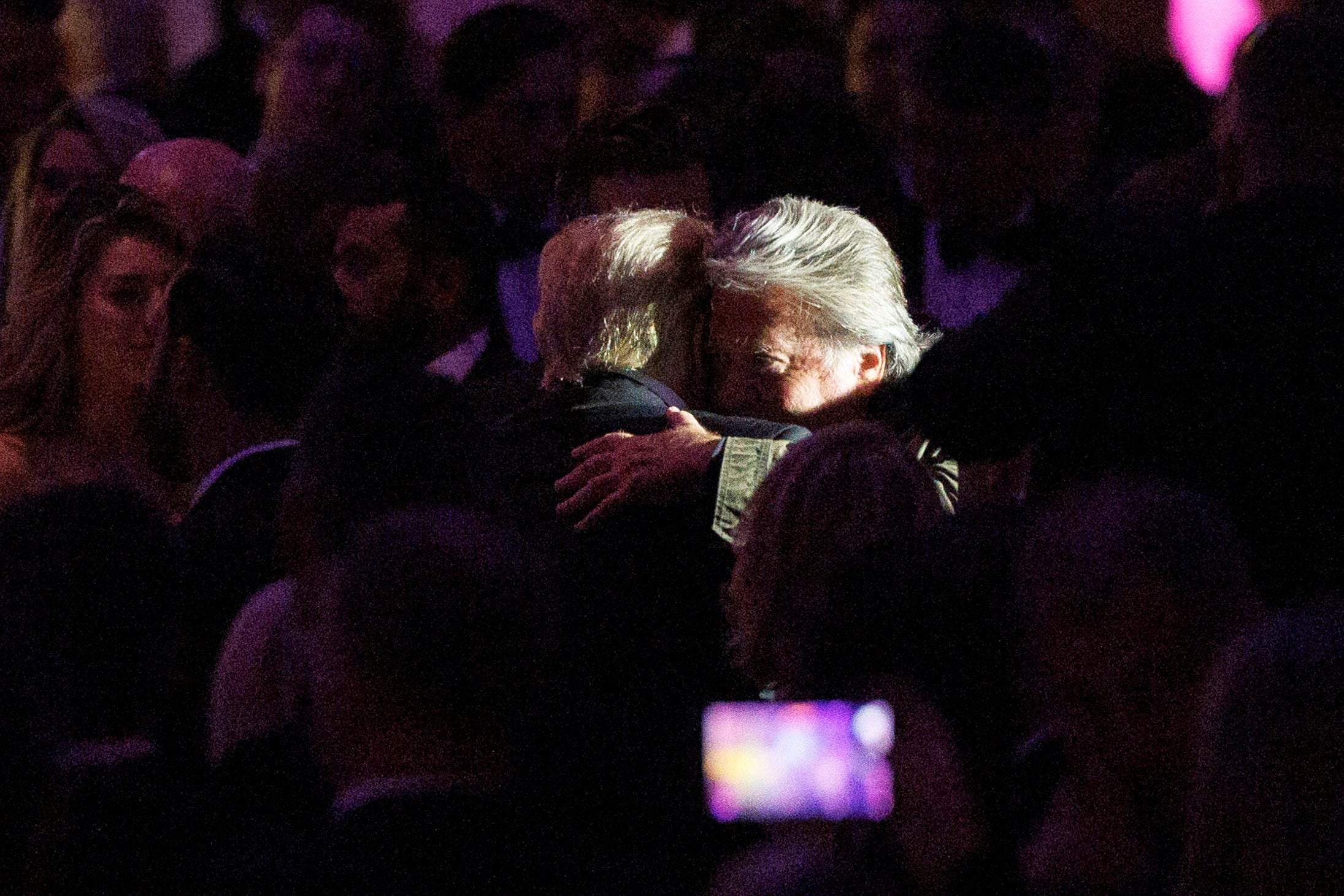
As he routinely labels the free press the “enemy of the people”, Mr Trump and his allies have called on the courts to strip first amendment protections by revisiting landmark precedent from a decades-old US Supreme Court case. At his rallies, he has suggested threatening reporters with jail time as a way to extract information from them, while joking that journalists and publishers could be “prison brides” if they refuse to cooperate.
That campaign of retribution and political prosecution is not merely “rhetoric” but a “dead serious” threat to his opponents and the media, according to his allies.
On his War Room podcast, former White House adviser and far-right activist Steve Bannon asked Trump loyalist Kash Patel whether he could “deliver the goods” and “get rolling on prosecutions” should Mr Trump win the election in 2024.
“And I want the Morning Joe producers that watch us and all the producers to watch us – this is not just rhetoric. We’re absolutely dead serious,” Bannon said. “The deep state, the administrative state, the fourth branch of government never mentioned in the constitution, is going to be taken apart, brick by brick, and the people that did these evil deeds will be held accountable and prosecuted, criminal prosecutions.”
Mr Patel said a team of “all-American patriots” in all levels of government in a potential Trump administration beginning in 2025 will “come after” members of the press that he claims have “lied about American citizens” and “helped Joe Biden rig presidential elections.”
“We’re going to come after you – whether it’s criminal or civilly, we’ll figure that out,” said Mr Patel, who joined the Trump administration in 2019 as a dubiously qualified intelligence official.
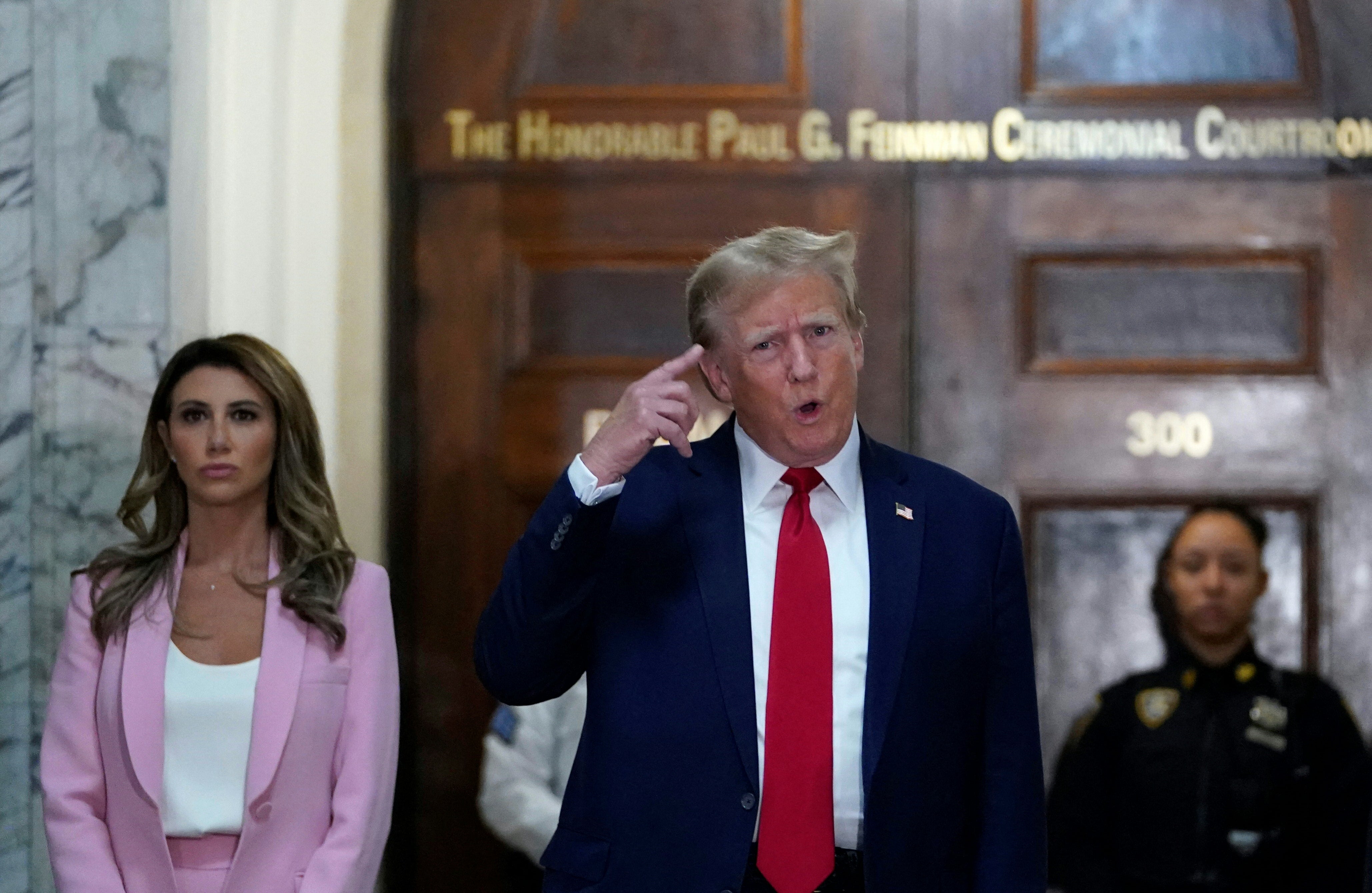
During a rally in Iowa in December, Mr Trump sought to justify his demands that his supporters “go into” cities to “watch” how elections are run by using the same false, dangerous claims he tossed around the 2020 election.
He falsely claimed that “they cheated like hell, they know it, and you’ll never find out all the ways but we don’t need all the ways.”
“The most important part of what’s coming up is to guard the vote, and you should go into Detroit, and you should go into Philadelphia, and you should go into some of these places – Atlanta – and you should go into some of these places, and we gotta watch those votes when they come in,” he said.
Philadelphia’s top elections official warned that his statements will be used to discredit the voting process, many months before a single ballot is even cast.
“This is nothing new, Trump says these things before every election, and I expect we will hear more of this over the next year,” Philadelphia City commissioner Lisa Deeley said in a statement. “I can only assume it is to try and sow doubt about the validity of the election results.”
If all else fails, his allies have suggested he would invoke the Insurrection Act to effectively convert the US military into a domestic police force.
Last year, he told a crowd in Iowa that he could send troops into Democratic-run cities.
“You look at any Democrat-run state, and it’s just not the same. It doesn’t work,” he said. “We cannot let it happen any longer. And one of the other things I’ll do – because you’re supposed to not be involved in that, you just have to be asked by the governor or the mayor to come in – the next time, I’m not waiting.”
The anti-immigration agenda
“When Mexico sends its people, they’re not sending their best,” Mr Trump said moments into his official campaign launch in 2015. “They’re not sending you. They’re sending people that have lots of problems, and they’re bringing those problems with us [sic]. They’re bringing drugs. They’re bringing crime. They’re rapists. And some, I assume, are good people.”
Later that year, Mr Trump praised a 1954 programme (named after a slur against Latinos and Hispanics) under President Dwight D Eisenhower, who “moved 1.5 million illegal immigrants out of this country, moved them just beyond the border,” Mr Trump said.
“They came back. Moved them again beyond the border, they came back. Didn’t like it. Moved them way south. They never came back. … We have no choice,” Mr Trump said.
In September of 2023, he once again praised “the Eisenhower model” and pledged to “carry out the largest domestic deportation operation in American history”.
In his rally speeches, Mr Trump has pledged to upend asylum protections for thousands of people who are legally in the US; round up undocumented people living in the US and detain them at camps before they’re expelled; and prohibit children born in the US to non-citizen parents from being granted citizenship.
He repeatedly refers to immigrants arriving at the US-Mexico border as “an invasion”.
“Lawless mobs of unscreened unvetted illegal alien migrants are stampeding across our border by the millions and millions, including hordes of criminals, terrorists, human traffickers, child smugglers, gang members and inmates emptied out of their prisons and insane asylums and mental institutions,” he said in Iowa in September.
“It’s actually worse than that,” he added. “This is an invasion and I’m one candidate who from day one knows exactly how to stop it.”
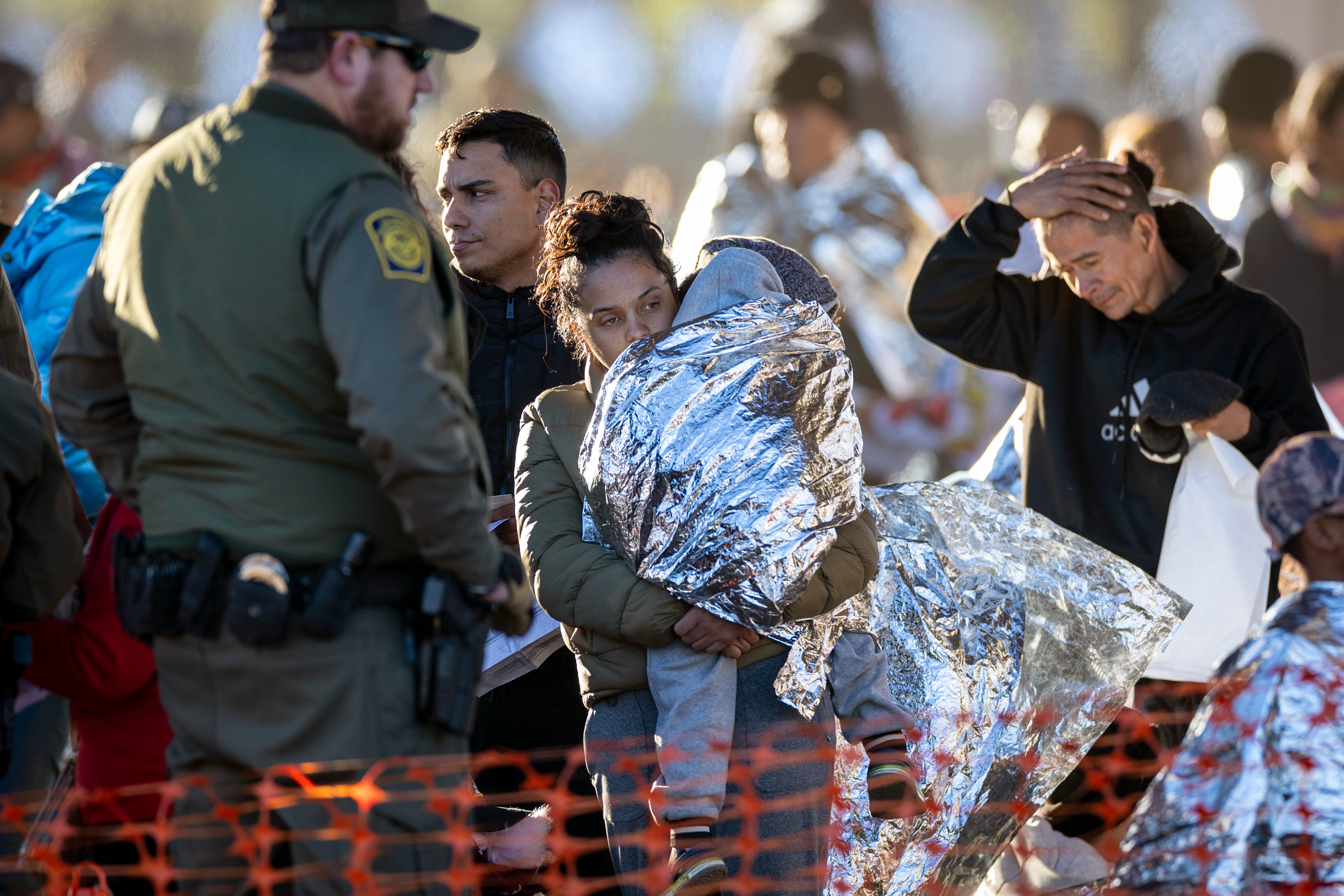
Immigrants are “poisoning the blood of our country,” according to Mr Trump, echoing Adolf Hitler’s screeds against “the poison which has invaded the national body” from an “influx of foreign blood” in his Mein Kampf.
His dehumanising rhetoric permits his supporters to degrade the “other” to prime their acceptance of the violence to come, while absolving them of responsibility for it, according to Ms Ben-Ghiat.
“They’re like trial balloons,” she told The Independent. “He says things to get people used to certain ideas. And then he repeats it over and over again … He wants to actually get Americans used to the idea of seeing immigrants as subhuman, as disease carriers, so that when he represses them, and he’s saying what he’s going to do – put them in camps, deport them en masse – there will be less pushback. He’s psychologically preparing Americans to accept his repression.”
His anti-immigrant agenda and focus on US-Mexico border security comes as congressional Republicans aim to condition any aid to Ukraine on Trump-approved border measures.
“To get support from Americans for whatever repression and also expenditures to do with the [border] wall, they have to present the threat as enormous,” Ms Ben-Ghiat told The Independent.
“You depict immigrants bringing disease into the country, you depict them as polluting our blood, you depict them in ways that create a generalised fear,” she said. “These are fascist tactics. Everything he’s doing – these are fascist tactics.”
‘America First’
In office, Mr Trump repeatedly complained about the nation’s cost burdens to Nato compared to other countries and even floated withdrawing from the alliance completely. A cryptic campaign pledge on his 2024 website merely says that “we have to finish the process we began under my administration of fundamentally re-evaluating Nato’s purpose and Nato’s mission”.
“There is great fear in Europe that a second Trump presidency would result in an actual pullout of the United States from Nato,” retired four-star US Navy admiral James G Stavridis, who was Nato’s supreme allied commander from 2009 to 2013, told The New York Times. “That would be an enormous strategic and historic failure on the part of our nation.”
The former president – who is still promising to “replace” the Affordable Care Act with an “alternative” without presenting any – has also repeatedly stated that he would “end” Russia’s invasion of Ukraine without explaining how. His “idea,” however, would push Ukraine to make major concessions that would effectively be a gift to Russia at the expense of Ukraine’s sovereignty and European stability.
“It’ll take 24 hours. I will get that ended,” he said in an interview with Nigel Farage with GB News in May. “It would be easy.”
Two months later, he told Fox News he would press Ukraine president Volodymyr Zelensky to “make a deal” with Russian president Vladimir Putin.
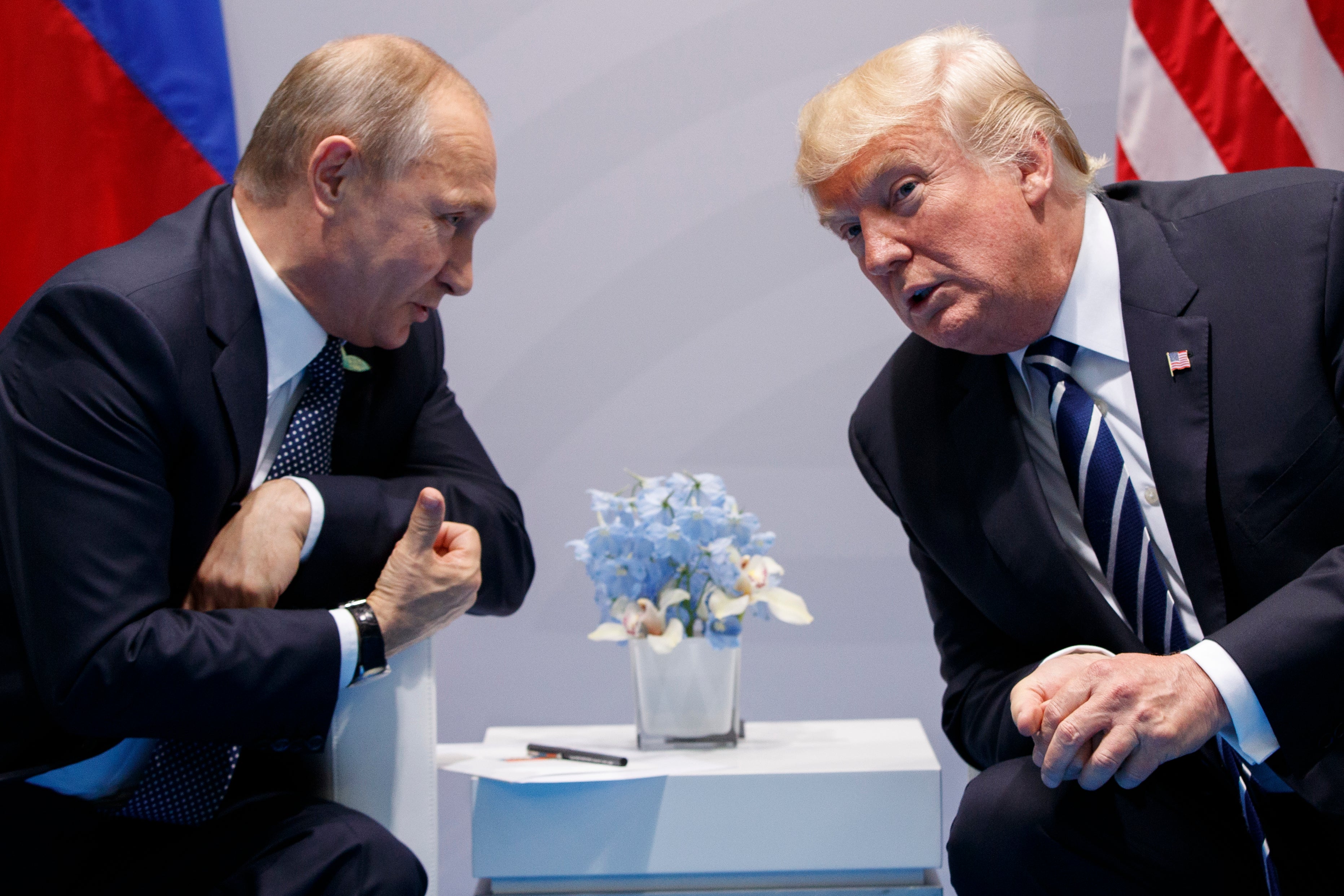
Mr Trump has also called on congressional Republicans to only allow military aid for Ukraine in exchange for investigations into the Biden family, a twist on his attempts in office to leverage US military aid for Ukraine in exchange for Mr Zelensky’s agreement to investigate the Bidens, which led to Mr Trump’s first impeachment.
And as the Biden campaign bleeds supporters with his administration’s support for Israel’s devastating bombardments and months-long siege of Gaza, where more than 20,000 Palestinians have been killed, Mr Trump appears to have benefited from his own incoherent response to the crisis.
The Trump administration’s 2020 “peace plan” – his self-anointed “deal of the century” endorsed by evangelical Christian officials and rejected by Palestinian officials – would redraw boundaries to incorporate Israeli settlements considered illegal under international law, hand control of Jerusalem to Israel, demilitarise the state of Palestine, and deny Palestinian refugees a right of return.
If he returns to the White House, Mr Trump has promised to reinstate and expand a “ban” on people immigrating to the US from majority-Muslim countries. He also has joined Republicans who have pledged to refuse to admit Palestinian refugees to the US in the wake of Hamas attacks in Israel on 7 October, as more than 2 million people in Gaza have been displaced by Israel’s retaliatory bombing.
Anti-trans attacks and ‘parents’ rights’
The Trump campaign’s “Protect Parents’ Rights” platform builds off a nationwide movement that took shape during the Covid-19 pandemic.
Volatile campaigns have targeted inclusive classroom curriculums, accused teachers of promoting “pornography” and “grooming” for LGBT+ inclusive materials, and launched a crusade against honest discussions of race and racism.
Those campaigns have galvanised “grassroots” support aligned with right-wing special interest groups with years-long designs on undermining and dissolving the US Department of Education, opening the door for rampant privatisation of what remains of American public education.
In his first term, the Trump administration’s Education Department eliminated guidance that ensured protections for trans students, among a slate of other measures opposed by LGBT+ advocates.
He also banned trans people from openly serving in the US military and reversed federal guidance under the Civil Rights Act that protected trans people from employment discrimination.
In the years that followed, Republican lawmakers and campaigns across the country have introduced a surge of legislation largely targeting young transgender Americans, facing hundreds of bills that would block access to best practice, potentially life-saving transition healthcare and ban them from sports that align with their gender, among other proposals that have torn families and state capitols apart.
At his rallies, Mr Trump repeats the transphobic phrase “keep men out of women’s sports” to push lawmakers to ban trans athletes from playing sports, proposals that have marginalised extremely small populations of young trans people across the country in state-level legislation that ignores the disproportionately high levels of discrimination and violence against them.
He has threatened to withhold federal funding from schools that he claims promote “gender ideology”.
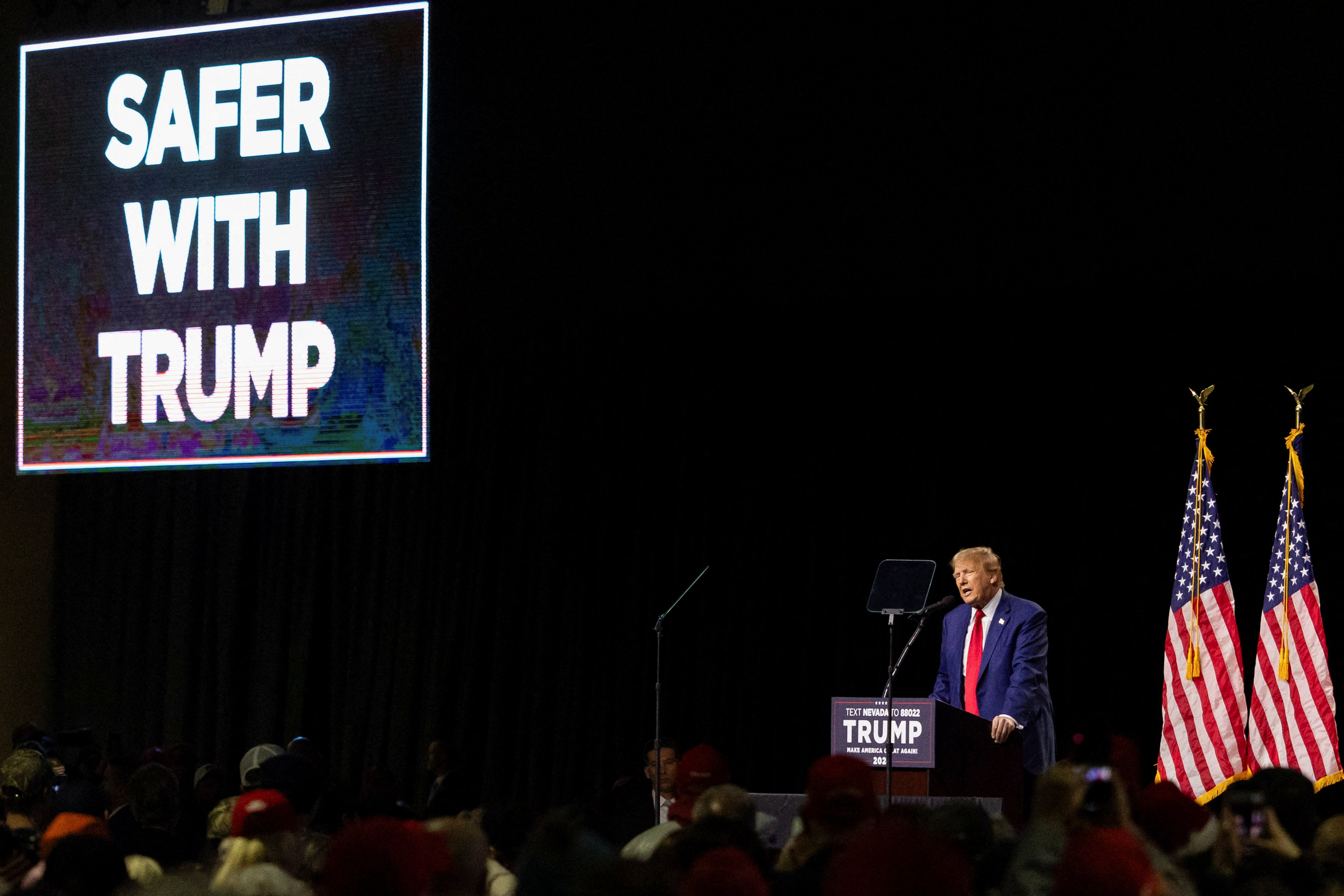
If elected, Mr Trump would use the full force of the federal government to “stop” gender-affirming healthcare for transgender minors, a range of care that includes mental health treatment as well as nonmedical services. He has called gender-affirming care “child abuse” and “child sexual mutilation.”
He also plans to direct the US Food and Drug Administration to study the effects of gender-affirming healthcare and so-called “trans ideology” on mental health and “violence”, continuing a baseless narrative that trans people are responsible for violent attacks across the country.
Mr Trump also wants the Justice Department to investigate doctors and pharmaceutical companies.
Endorsing police violence and expanding executions
The US executed three people in the 60 years before Mr Trump entered the White House.
He put 13 people to death within six months.
His administration oversaw more executions than any other administration in 120 years, including more executions in a one-year period than every state combined.
In office, Mr Trump routinely praised executions for drug crimes in China and Singapore and circulated a memo through his then attorney general Jeff Sessions for prosecutors to “strongly” seek the death penalty for people caught “dealing in extremely large quantities of drugs”.
When a mob of his supporters chanted “Hang Mike Pence” while storming the halls of Congress on 6 January, Mr Trump complained to his staff that his vice-president was being whisked away to safety, according to one account from testimony to the House select committee that investigated the attack.
Years earlier, when five Black and Latino teenagers were wrongly convicted of the rape of a jogger in New York City’s Central Park in 1989, Mr Trump bought a full-page statement in The New York Daily News titled: “BRING BACK THE DEATH PENALTY. BRING BACK OUR POLICE!”
“I want to hate these murderers and I always will,” he wrote in 1989. “I am not looking to psychoanalyse or understand them, I am looking to punish them.”
Their convictions were vacated in 2002, and the city paid $41m in 2014 to settle a civil rights lawsuit.
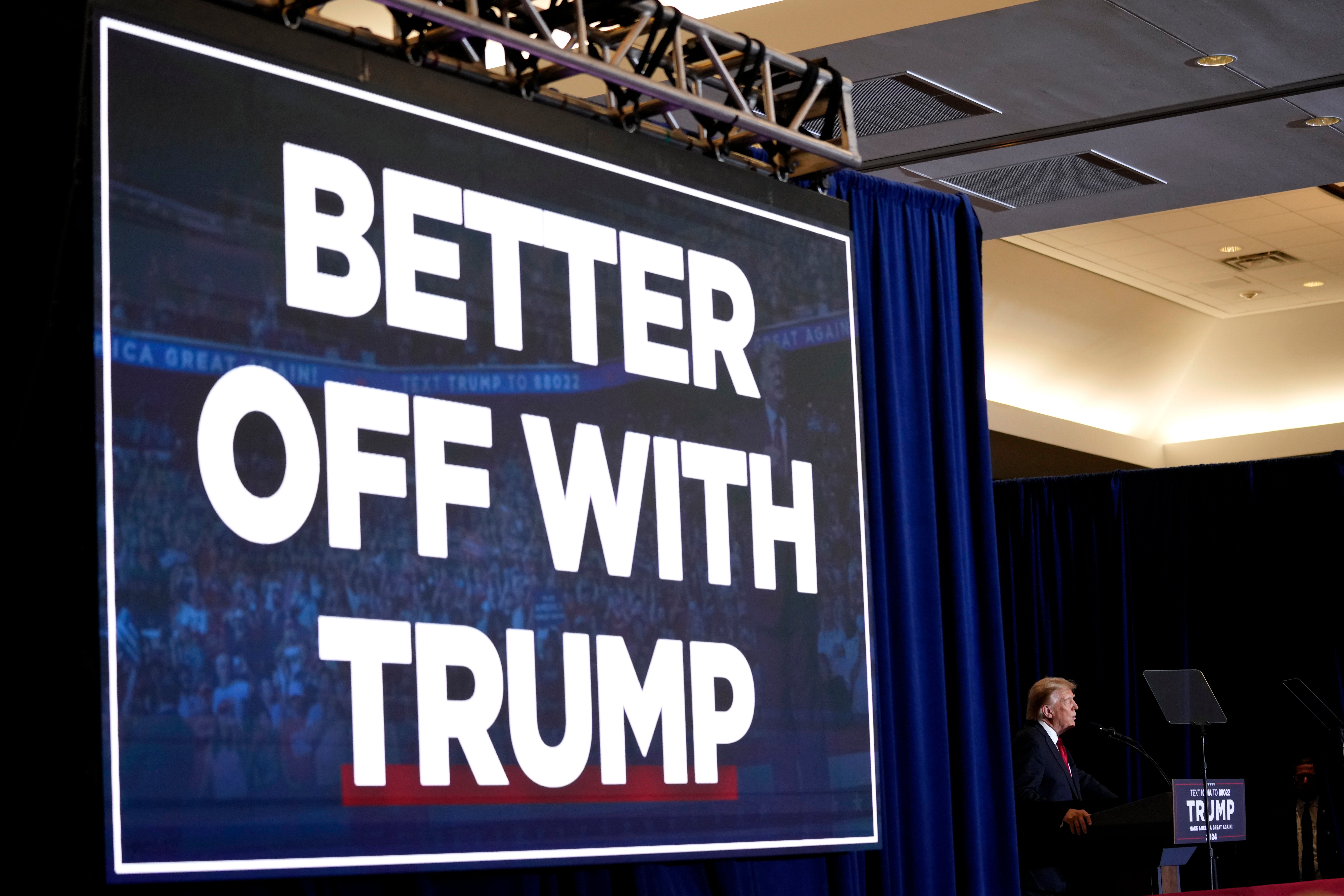
An explicitly violent feature of his 2024 campaign is a routine vow to sentence even more people to death. People should be “shot” on sight for crimes like shoplifting, according to Mr Trump.
“Very simply: if you rob a store, you can fully expect to be shot as you are leaving that store,” he told supporters in California in September.
Weeks before officially declaring his candidacy, Mr Trump called on members of Congress to approve the death penalty for people convicted of drug trafficking. “Under Democrat [sic] control, the streets of our great cities are drenched in the blood of innocent victims,” he said at a rally in Pennsylvania.
“We would solve that problem so fast,” he added. “I’m calling on Republicans and Democrats immediately to institute – to get to Washington and institute the death penalty for drug dealers. You will no longer have a problem.”
He also urged Congress to “immediately” approve the death penalty for people convicted of human trafficking.
Mr Trump has long embraced the so-called “law and order” mantra, arguing that his Democratic rivals are stopping police from doing their jobs. His 2024 campaign now promises to “indemnify” officers accused of misconduct. At a rally in Reno, Nevada, he suggested the government would pay them for their legal costs.
“We are going to indemnify them, so they don’t lose their wife, their family, their pension and their job,” he told supporters in New York last month.
During a speech in Nevada, he said police are “afraid to do anything”, are “forced to avoid any conflict” and “forced to let a lot of bad people do what they want to do”.
Join our commenting forum
Join thought-provoking conversations, follow other Independent readers and see their replies
Comments